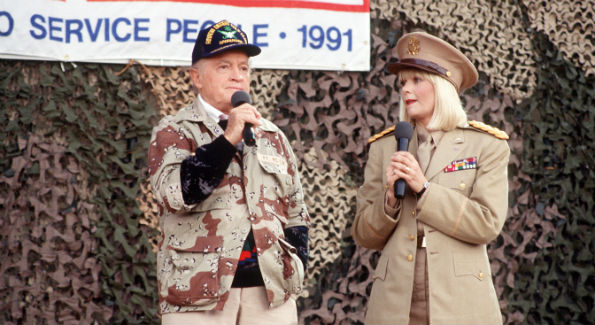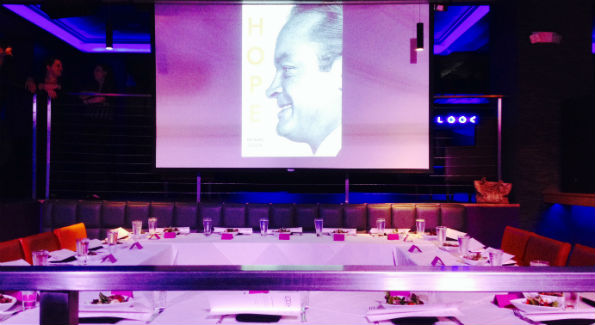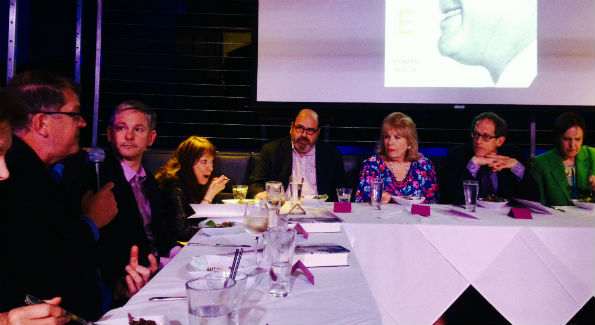Bob Hope’s biographer discusses the man who defined entertainment.
By Erica Moody
“I don’t know if Jimmy Fallon knows who Bob Hope is,” Richard Zoglin suggests. “I really don’t.”
Many millennials may not have heard of Hope, but Zoglin is aiming to change that. His new book Hope: Entertainer of the Century is the first comprehensive (500+ page) biography of the man who basically invented modern stand-up comedy but, for one reason or another, has been overlooked in the public memory. A group of about 20 Washington media folks and a few Hope family members came together at LOOK restaurant last week for a dinner hosted by Hollywood on the Potomac’s Janet Donovan and restaurant owner Michael Kosmides for the chance to ask Zoglin anything about ‘Hope’ and its subject, all on the record.
Guests including Bob Hope’s nephew Tom Malatesta and his wife Beverly, The Atlantic’s Steve Clemons, The Washington Post’s Karen Tumulty, TV personality Bill Press, The Daily Caller’s Betsy Rothstein, TIME’s Lissa August and Newsweek’s Matt Cooper enjoyed crab cakes, key lime pie and plenty of wine as a mic was passed around the table for questions.
“How do we make sure that he keeps the credit for what he did instead of letting what he started be passed over for the people who came after him?” asked Hollywood on the Potomac’s Brendan Kownacki.
“I felt I was really helping people rediscover somebody who had been unjustly neglected for many years,” Zoglin said and pointed to Hope’s charity work and how he traveled abroad every year unpaid to entertain the troops. “Bob Hope set a model, set a standard for Hollywood, telling Hollywood by his actions that you have an obligation as a star to do more than just make movies and sign autographs and buy big homes in Malibu or something. You have an obligation to use your celebrity to do good…George Clooney and Angelina Jolie, and the whole concept of the star using the celebrity to work for good causes, I do think they all owe a debt to Bob Hope.”
Zoglin, who previously wrote a book on stand-up comedy in the 1970s, is clearly knowledgeable of the subject. His claim is that Hope “invented an art form” and makes the case for him as the defining entertainer of the twentieth century. Hope was able to achieve success in every major mass-entertainment medium, from vaudeville in his early career to television and film.
“I think it’s very hard for someone to be the kind of all-encompassing star that Bob Hope was, the way that Bob Hope blanketed American culture of the ’50s,” Zoglin said. “I don’t think that anybody can do that today. He really was the American star.”
Despite the fact that Hope’s nephew was in the room, guests didn’t hold back from asking about Hope’s “philandering,” as writer Annie Groer put it. Probing questions aside, Tom Malatesta was happy with the book and didn’t mind being a source for Zoglin, as he told Washington Life:
“Richard is a very thoughtful and concise gent. It was clear in speaking with him on numerous occasions that he had no ax to grind in writing the biography of Hope. He did his homework and when he needed to validate or question an item he was precise in his thoughts. Numerous individuals told me they had very pleasant conversations with him and that he was all ‘business’….. not looking for the sensational. I personally thought he captured Hope well and wrote a meaningful book. Hope was an immensely hard working professional and I thought the book captured well his journey to fame and stardom. Growing up he was an intimidating presence and one always was aware of the personae of Bob Hope.”
Would Bob have liked the book? Did he want a book written about him at all?
“I think he was just as happy to keep his life story quiet,” Zoglin said. “I don’t think he’d be particularly happy with the book because it tells too much. He probably didn’t care to have his bad attitude laid out there for everybody to see.”
The book is now in its third printing. Pick up a copy for an uncompromising look at a man who defined entertainment.







